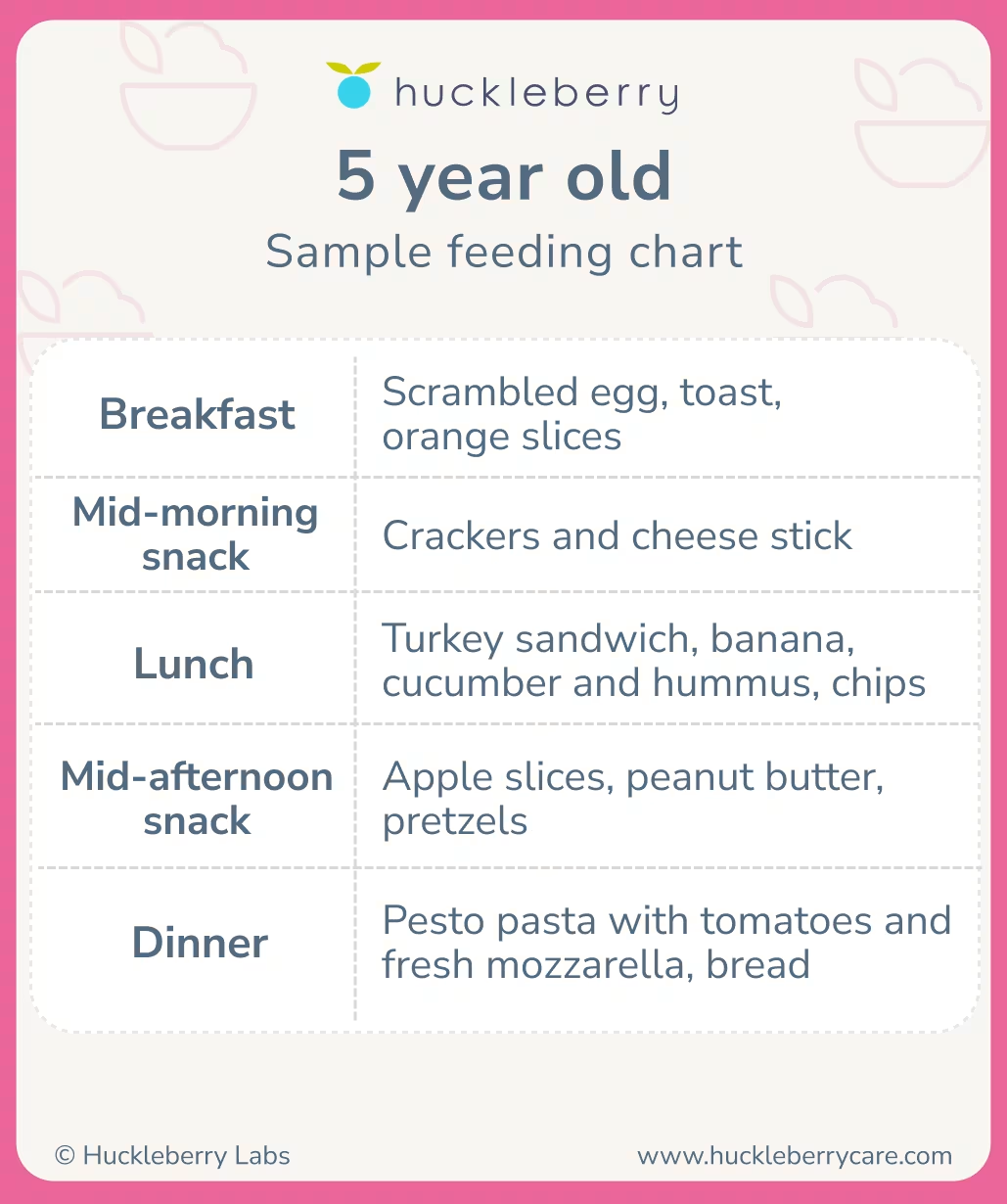5 year old feeding schedule: Amounts and food chart
Updated Jan 02, 2026

At 5 years old, your child is transitioning from the preschool phase into the realm of being a big kid. Starting kindergarten can change the game a bit when it comes to feeding. Eating lunch at school as well as interactions with peers may influence your family’s feeding dynamic. Keep reading for all you need to know about feeding your five year old.
5 year old child sample feeding schedule
Around 5 years old, you may begin to see your child become a more curious eater. Typically, tendencies start to fade a bit and kids at this age really enjoy being part of meal planning and prep. If you can, try to involve them by allowing them to do simple cooking tasks or let them help choose foods at the grocery store.
At this age, kids will eat roughly every 3 - 4 hours but may go longer between meals, especially if they are in school. Sometimes, we see a shift away from a morning snack once kindergarten starts and an uptick in the afternoon snack, particularly if kids are in school for a full day.
Below is a sample feeding schedule for a 5 year old. Use it as a guide, but know it may be adjusted to fit your family’s needs.
How much to feed a 5 year old: Food chart
The key to feeding your five year old is to keep offering a variety of foods and to keep modeling healthy eating habits. Involve your child in making choices about their meal when possible. For example, let them choose either strawberries or blueberries with their oatmeal.
5 year old feeding chart

5 tips for feeding your 5 year old
Tip | Notes |
Eliminate distractions | Keep mealtimes free from distractions so your child focus on eating, practice manners, and engage in family conversations. |
Focus on breakfast | A balanced, protein-rich breakfast fuels your child’s body and brain. Research shows it can boost school performance and focus. |
Create a meal and snack schedule | Continue setting regular meal and snack times to prevent grazing and help your child tune into natural hunger and fullness cues. |
Offer a variety of foods | Encourage variety by introducing new foods alongside familiar ones and trying them together to build confidence and lifelong healthy habits. |
Involve kids in the kitchen | Let your child help plan, shop, and cook when possible. Involvement builds independence, food curiosity, and future healthy eating skills. |
Tip #1: Eliminate distractions
As much as possible, eliminate distractions during mealtime. , put away toys and phones, and allow your family to enjoy the time together.
This not only allows your child to focus on eating but also helps them learn about table manners and practice having conversations with others.
Tip #2: Focus on breakfast
Breakfast is sometimes called the most important meal of the day and with good reason! Serving your child a balanced, breakfast sets them up for success all day long, especially if they are headed to school.
Research shows [] that eating breakfast positively impacts kids’ school performance.
Tip #3: Create a meal and snack schedule
As your child becomes more independent, it can be tempting to leave more eating decisions to them. However, it is still best that the parent or caregiver sets the meal and snack schedule.
This allows children to learn more about their body’s hunger and fullness cues as well as encourages them to eat more consciously at mealtime instead of grazing throughout the day.
Tip #4: Offer a variety of foods
Even though pickiness tends to fade a bit around five years old, kids can get stuck in food ruts sometimes. Adults do too! Do your best to offer a variety of foods and to try new foods with your child.
They don’t have to like everything (neither do you!), but this builds skills to try new foods and to eat a variety of foods throughout their lifetime.
Tip #5: Involve kids in the kitchen
Cooking with kids can be messy, but it can also be fun and rewarding! When you can, involve your kiddo in the cooking process. Whether it’s helping plan meals, grocery shopping, or preparing a meal or snack, this involvement makes them more likely to try foods.
Additionally, it helps teach them skills they will need in the future to make healthful eating decisions.
Night feedings for a 5 year old
Typically, five year olds should not need to eat overnight. Be sure to offer enough opportunities to eat throughout the day and watch out for foods that could make it difficult to sleep - such as foods or beverages containing caffeine, etc. If your child is struggling with night wakings from hunger, talk to your pediatrician.
At this age, early morning awakenings in children are often attributed to hunger, as it's challenging for many to go over 12 hours without eating. For example, a 5:30 PM dinner could mean a 5:30 AM wake-up. Even children who usually sleep well may find it difficult to return to sleep if they're hungry. If you’re dealing with early risings, consider having dinner a bit later or providing a nutritious snack before starting the bedtime routine.
Note that it’s common for kindergarteners to have , whether they’re related to hunger or not. Consider submitting for a customized sleep plan through if you’d like expert help and step-by-step guidance.
Takeaway
Feeding changes: At this age, kids will eat roughly every 3 - 4 hours but may go longer between meals, especially if they've started school. Sometimes, we see a shift away from a morning snack once kindergarten starts and an uptick in the afternoon snack, particularly if kids are in school for a full day.
Involve them in meals: Keep enjoying a variety of foods together and include them in meal prep when possible. It’s all about instilling good habits at this age.
Handling early rising: If you’re dealing with early risings, consider having dinner a bit later or providing a nutritious snack before starting the bedtime routine. It can be hard for 5 year olds to go over 12 hours without eating between dinner and breakfast.
Revisit a here for a refresher.
Share article:
Note: The content on this site is for informational purposes only and should not replace medical advice from your doctor, pediatrician, or medical professional. If you have questions or concerns, you should contact a medical professional.
1 Sources
Share article:








